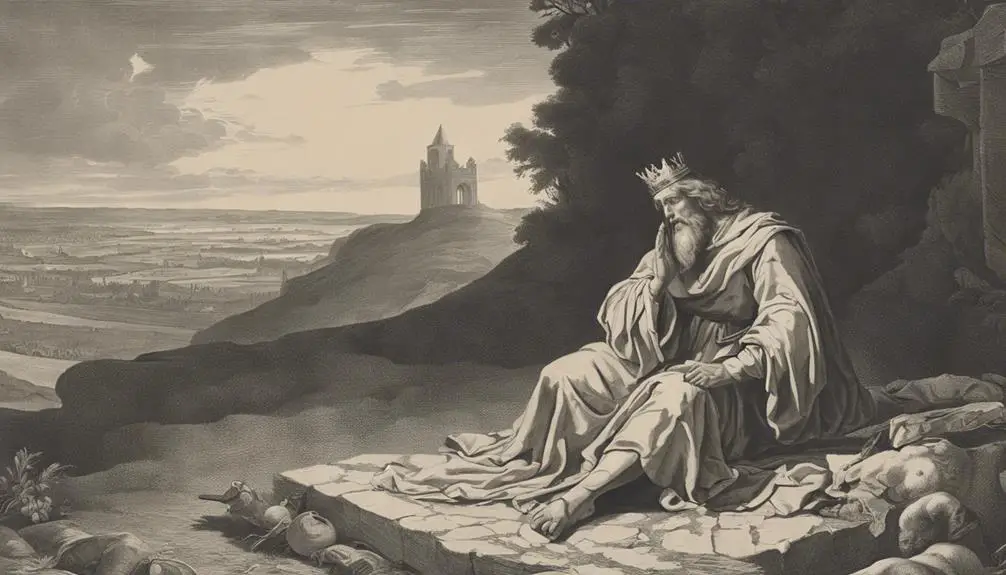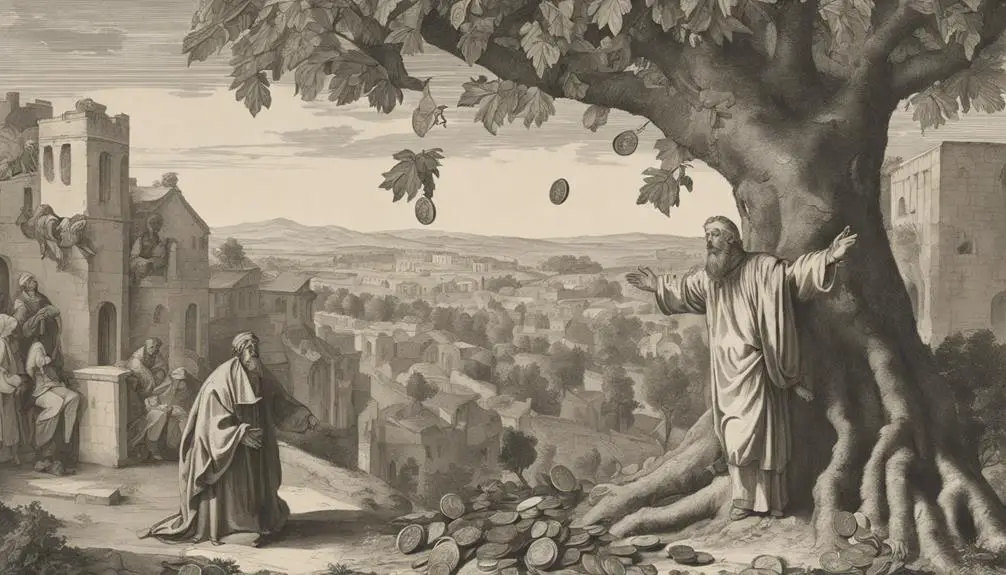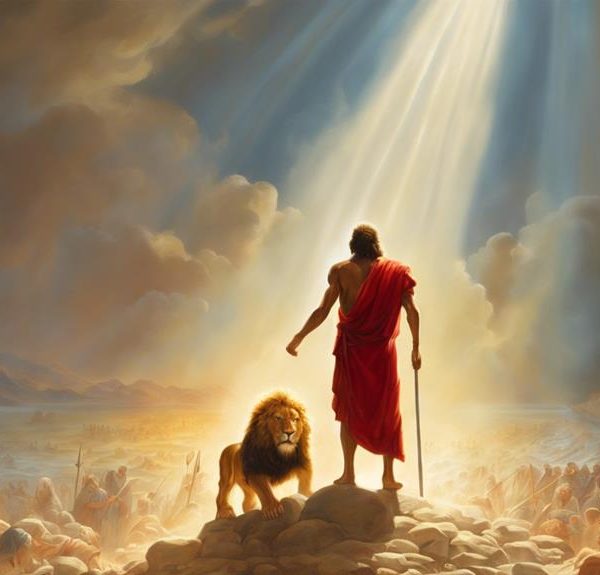Witness the transformative power of remorse and redemption in the Bible's most poignant tales of repentance; a journey awaits you.

Stories of Repentance in the Bible
Like a rich tapestry woven with threads of remorse and redemption, the Bible is rife with tales of repentance.
You'll see the regret of Adam and Eve, the sorrow of David, and the contrition of Jonah, among others.
But what is the deeper significance of these stories?
How do they speak to us today, in our own moments of regret and desire for forgiveness?
These questions, and more, await your thoughtful exploration.
Key Takeaways
- Biblical stories depict repentance as a transformative process leading to forgiveness, humility, and spiritual growth.
- Key biblical figures like King David, Peter, and the Prodigal Son illustrate the power of remorse and redemption.
- God's response to repentance in the Bible affirm his love, mercy, and willingness to restore relationships.
- Genuine repentance involves acknowledging wrongdoing, seeking forgiveness, making amends, and inspiring change in others.
Adam and Eve: A First Act of Penance

In the genesis of repentance stories, none stands out quite like the tale of Adam and Eve, whose actions in the Garden of Eden marked the first act of penance in biblical history. This narrative is a study of Eden's temptation, humanity's fall into sin, and the profound impact of that original sin.
You're invited to consider the details of this event. A serpent, symbolizing deceit and temptation, lured Eve into eating fruit from the forbidden tree. She, in turn, enticed Adam. This act of disobedience against God's direct commandment represents the first sin, birthing the concept of Original Sin's Impact.
The repercussions were immediate and severe. Stripped of their innocence, Adam and Eve became aware of their nakedness, thus introducing shame into human consciousness. Their punishment was exile from Eden, a metaphorical death, and the beginning of human mortality.
The act of penance is evident in their acceptance of punishment and God's promise of redemption through the future Messiah. This story, in essence, sets the stage for the rest of the biblical narrative, highlighting the human propensity for sin, the need for repentance, and God's relentless pursuit of a fallen humanity.
David's Repentance for Uriah's Wife

Another striking tale of repentance in the Bible revolves around King David, who was deeply remorseful after committing adultery with Bathsheba, Uriah's wife. From Bathsheba's perspective, she'd become a pawn in a tragic tale of lust and deceit. Her husband, Uriah, a loyal soldier, was unknowingly betrayed, his honor trampled upon.
David's guilt becomes evident when confronted by Prophet Nathan. He acknowledges his sin and pleads for God's mercy. His repentance is genuine, heartfelt, resulting in Psalm 51, a poignant prayer of contrition.
To better understand the depth of David's remorse, consider this table:
Perspective |
Action |
Emotional Impact |
|---|---|---|
David's |
Adultery |
Guilt, remorse |
Bathsheba's |
Betrayal |
Sorrow, despair |
Uriah's |
Honor violated |
Unaware, then death |
Each row represents a different viewpoint, emphasizing the gravity of David's actions.
David's repentance is a lesson in humility and the power of forgiveness. It underscores the gravity of sin, but also the boundless mercy of God. His sin caused pain and death, yet his genuine repentance brought about divine mercy. This narrative serves as a stark reminder that even kings are not above God's moral law.
Jonah's Redemption in Nineveh

Turning our attention to Jonah, we find a stirring tale of repentance in the heart of Nineveh. Jonah's story is one fraught with reluctance, a testament to his human frailty. He was initially hesitant to heed God's call, revealing a stark contrast between divine compassion and Jonah's reluctance. His evasion led him into the belly of a whale, a dire circumstance that ultimately drove his plea for redemption.
The city of Nineveh, known for its wickedness, was the target of God's impending wrath. Yet, the response of Nineveh is a powerful example of collective repentance. The Ninevites, upon hearing Jonah's message, demonstrated immediate remorse, fasting, and praying for mercy. Their king even declared, 'Let everyone call urgently on God…let them give up their evil ways and their violence.'
This dramatic turnaround showcases the transformative power of repentance. Nineveh's response was so profound that God chose mercy over destruction. It underscores God's willingness to forgive those who truly repent, regardless of their past transgressions. Jonah's redemption in Nineveh, therefore, serves as a reminder of God's boundless mercy, the potential for change in every sinner, and the immense power of repentance.
Peter's Remorse After Denying Christ

Just as Jonah's story exemplifies God's mercy toward a sinful city, we see a deeply personal manifestation of this divine compassion in the repentance story of Peter, who felt profound remorse after denying Christ. Peter's regret, however, wasn't a dead-end; it marked the starting point of a journey towards forgiveness and self-realization.
Peter, the rock upon which Christ planned to build his church, thrice denied knowing Jesus on the eve of Christ's crucifixion. This denial was a severe betrayal, a stark contrast to Peter's earlier proclamation of unwavering loyalty. The cock crowed, and Peter's eyes were opened to the enormity of his actions. His heart was gripped with regret, guilt, and shame.
Yet, Christ's forgiveness awaited Peter. After the resurrection, Christ offered Peter a chance to affirm his love thrice, mirroring his previous denial. This act wasn't only about restoring Peter's standing among the disciples but also about healing Peter's wounded spirit. It illustrates the unending mercy of God, who willingly forgives, restores, and strengthens those who genuinely repent.
In Peter's remorse and Christ's forgiveness, we see an enduring testament to the transformational power of repentance and divine mercy.
The Prodigal Son's Return

Diving deeper into the biblical narratives of repentance, you'll find the compelling tale of the Prodigal Son, an eloquent demonstration of remorse, forgiveness, and the transformative power of repentance. The narrative showcases two key themes, Fatherly Forgiveness and Brotherly Resentment, which profoundly shape the son's journey to redemption.
The Fatherly Forgiveness, lavished upon the Prodigal Son upon his return, symbolizes divine mercy and grace. Despite squandering his inheritance in reckless living, the son's sincere repentance melts the father's heart. The father's response, marked by unconditional love and forgiveness, provides a potent illustration of God's boundless mercy towards repentant sinners.
Conversely, the Brotherly Resentment is a stark contrast to the father's forgiveness. The elder son, who faithfully served his father, harbors resentment towards his wayward brother's sudden return and their father's unmerited favor. His inability to rejoice at his brother's repentance reveals a self-righteous attitude, reflecting the human struggle to extend grace to those we deem undeserving.
Zacchaeus: A Tax Collector's Transformation

Shifting our focus from familial relationships to societal outcasts, we encounter the transformative story of Zacchaeus, a despised tax collector whose life was radically changed by an encounter with Jesus. This encounter signifies the tax collector's change, an event that transposes Zacchaeus from a societal pariah into a devoted follower of Christ.
Before Meeting Jesus |
After Meeting Jesus |
|---|---|
Exploiter |
Restorer |
Greedy |
Generous |
Despised |
Redeemed |
Zacchaeus's conversion wasn't just a personal transformation; it also had societal implications. Upon meeting Jesus, Zacchaeus publicly vowed to give half of his possessions to the poor and repay fourfold anyone he had defrauded. This public declaration demonstrated his repentance and restitution, two crucial elements of genuine conversion.
In Zacchaeus's story, we see that no one is beyond the reach of God's transformative love. Jesus's interaction with Zacchaeus highlights the power of grace to induce repentance and effect change, even in the most despised societal outcast. Thus, the narrative of Zacchaeus serves as a potent reminder that transformation is possible for anyone willing to open their heart to divine love and grace.
Frequently Asked Questions
What Are Some Other Less Known Stories of Repentance in the Bible Not Discussed in These Sections?
You're asking about lesser-known biblical tales of repentance.
Let's dive into the symbolism of repentance in these narratives.
One such story is the Prodigal Son. Analyzing this, you see a rebellious son who returns home, repentant, to a forgiving father.
It's less known but rich in lessons about repentance, forgiveness, and unconditional love.
There's much more to discover, as the Bible teems with similar, yet often overlooked, stories.
How Does the Concept of Repentance in the Bible Compare to Other Religious Texts?
You're examining the concept of repentance across different religious texts.
In Islam, repentance is crucial, known as 'Tawbah', it's the act of turning back to Allah after sinning.
Hinduism, however, lacks a direct equivalent but promotes self-realization and the rectification of wrongs.
Comparatively, each religion emphasises the importance of self-improvement and moral rectitude, but the methods and intricacies vary.
Are There Any Stories in the Bible Where Repentance Did Not Lead to Forgiveness?
You're asking if there are instances where repentance didn't result in forgiveness. Well, in biblical texts, repentance symbolism is often tied to forgiveness.
However, there are cases, like King Saul's story, where repentance doesn't absolve sins. His repentance consequences included losing his kingdom.
How Has the Interpretation of These Biblical Repentance Stories Changed Throughout History?
You've asked how the interpretation of repentance symbolism has evolved over time. This evolution reflects societal changes, theological shifts, and philosophical developments.
In earlier periods, repentance was often viewed strictly as a return to moral obedience. Modern interpretation, however, emphasizes the transformative power of repentance, portraying it as a process of inner change and spiritual growth.
Thus, the interpretation of these stories is dynamic, adapting to cultural and intellectual trends.
Are There Any Common Themes or Lessons in These Stories of Repentance That Can Be Applied to Modern Day Life?
Absolutely, you'll find common themes in these tales that relate to modern repentance practices. They often emphasise the importance of sincerity, humility, and change of heart.
These narratives show that repentance isn't just about admitting wrongdoing, but also making amends and striving for improvement.
This biblical repentance symbolism serves as a powerful tool for understanding and guiding moral behavior in today's world, encouraging personal growth and ethical conduct.
Conclusion
In reviewing these biblical narratives, you're reminded of the transformative power of repentance. From Adam and Eve's first act of penance to Zacchaeus's remarkable transformation, the theme of remorse, forgiveness, and change resonates.
These stories not only illustrate the human capacity for error but also our potential for redemption. They challenge you to consider your actions and the possibility of personal growth through repentance.
Indeed, these tales are timeless lessons in humility, remorse, and redemption.



Sign up